Experiencing IRC's work on water, sanitation and hygiene in Uganda on my first trip
Published on: 04/08/2022
Kampala, the capital of Uganda, is known as the city of 7 iconic hills. However, over the years Kampala has expanded and grown so much that the city now covers more than 21 hills.
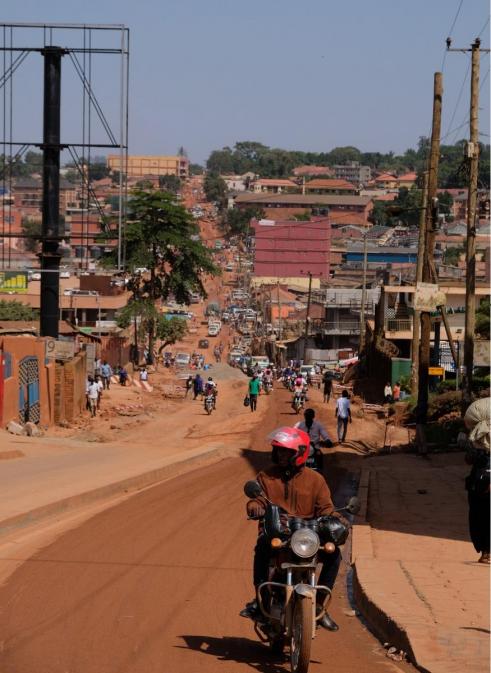
Kampala during the day (photo: Laura Bosma/IRC)
My first few months at IRC were exciting and tiring at the same time, but most of all super fun! I got the opportunity to visit Uganda on my first trip as Project Officer within the Secretariat. My colleagues did warn me from the start, but you really do hit the ground running at IRC.
While I was flying over the Sahara Desert, the subtropical rainforests, dry steppe, and grass savanna, I could not be more excited to see the Kabarole master plan, drawn up with assistance from IRC, in action and meet the people who work hard to achieve universal sustainable access to water, sanitation and hygiene (WASH).
Jane Nabunnya Mulumba (country director of IRC Uganda) and the team welcomed me with open arms. Naomi Kabarungi (communications and advocacy manager) and I travelled to Kabarole district for multiple school engagements and to see the master plan in action!
Travelling through a number of towns was very worthwhile. I passed the beautiful scenery, saw children in very colourful uniforms going to school, and markets where you could buy the most delicious fruit such as passion fruit, mangos, and bananas. According to Martin Watsisi (regional WASH advisor), my colleague, the bananas in the Netherlands are not real bananas – and I must say after I having tasted the Ugandan ones, I agree. After six hours we arrived in Fort Portal, the very green capital of our partner district, Kabarole.
Our first school engagement was at Rwankenzi Primary School. There was no running water, and the water tanks were empty. Naomi introduced IRC to the school and talked about the work we do in the district which includes, capacity-building, promoting WASH facilities, and sustainable cooperation. Sustainable cooperation will be achieved through commitment, engagement, and training in monitoring and accountability. Everyone in the room was enthusiastic about targeting the needs of the schools. Especially the children were eager to tell what they needed and why!
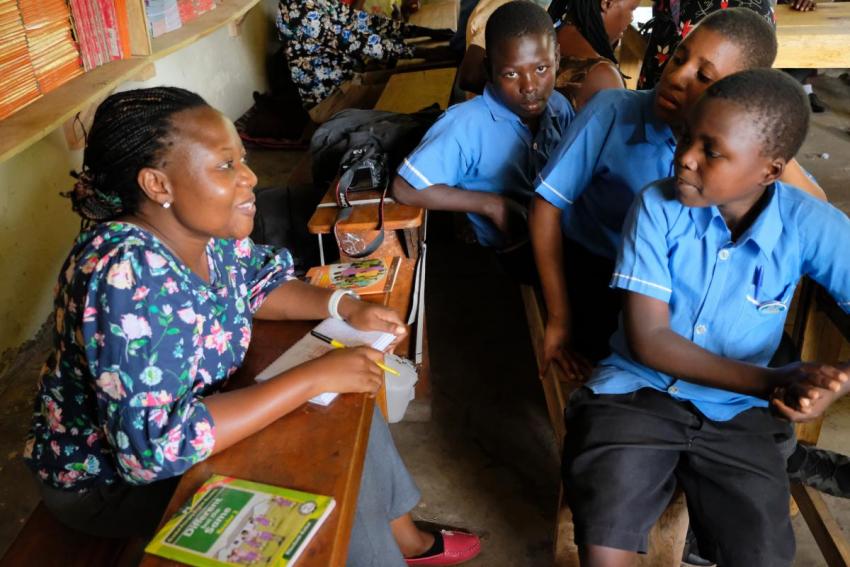
Naomi Kabarungi asked the Rwankenzi pupils, including Chair Ronald (13 years old who wants to become a doctor and was chosen as chair because of his excellent English) their thoughts on what kind of WASH facilities their school needs. (photo: Laura Bosma/IRC)
I was (pleasantly) surprised that there was time to talk about specific girl challenges, such as managing periods. In most parts of the world, like in Nepal, there is still a huge taboo or even period shaming, let alone tackling the problems. Gender segregated toilets and sanitary towels were mentioned as solutions.
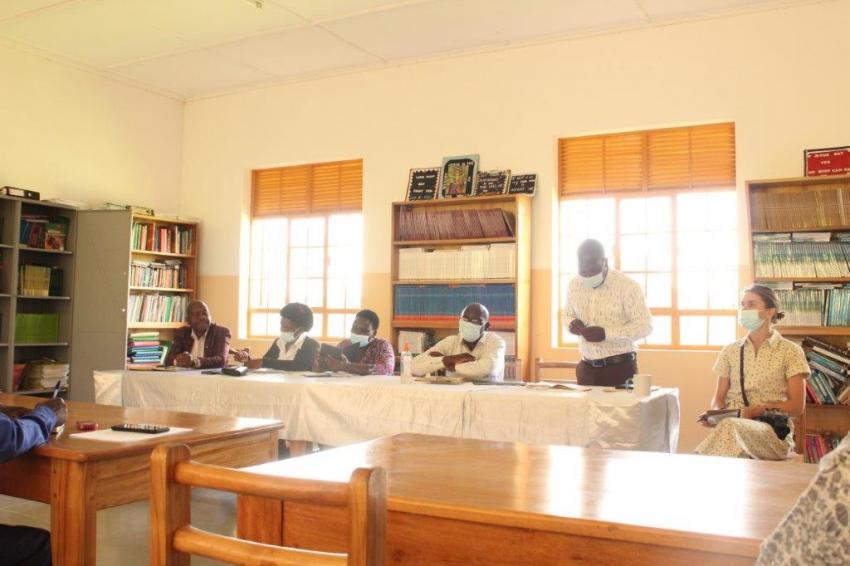
Laura Bosma, Mary Concepta, Cecilia Birungi at a school engagement in the Kabarole district (photo: Naomi Kabarungi/IRC)
During the day, I got the chance to talk to Cecilia Birungi (Kabarole’s health inspector) and we spoke about the challenges and opportunities of school facilities, model schools, and hurdles such as different priorities and agendas that need to be overcome in partnerships and collaborations.
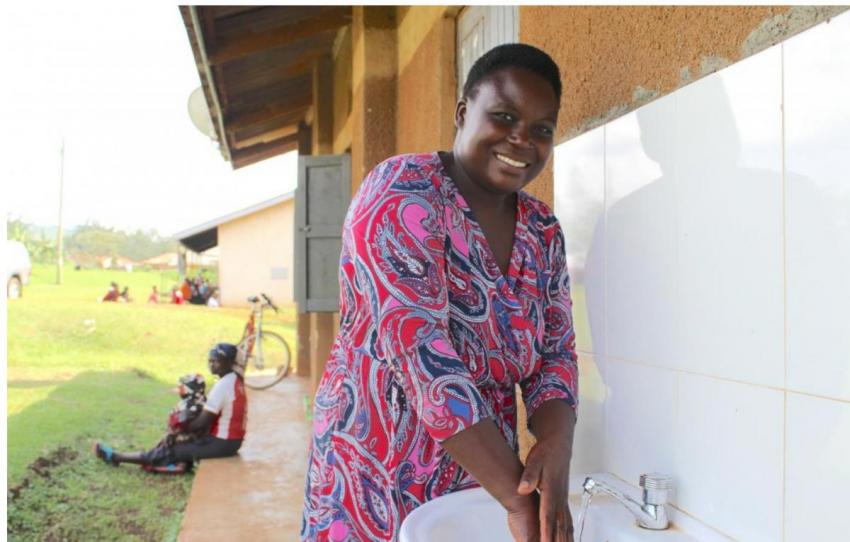
Cecilia Birungi using a water tap at a health care facility in Kabarole funded by Conrad N. Hilton Foundation (photo: Naomi Kabarungi/IRC)
Cecilia showed me one of the health care facilities funded by the Conrad N. Hilton Foundation. Pregnant women were able to stay the night, there was running water and even a placenta pit. I learned that the pit allows placenta disposals to decompose naturally.
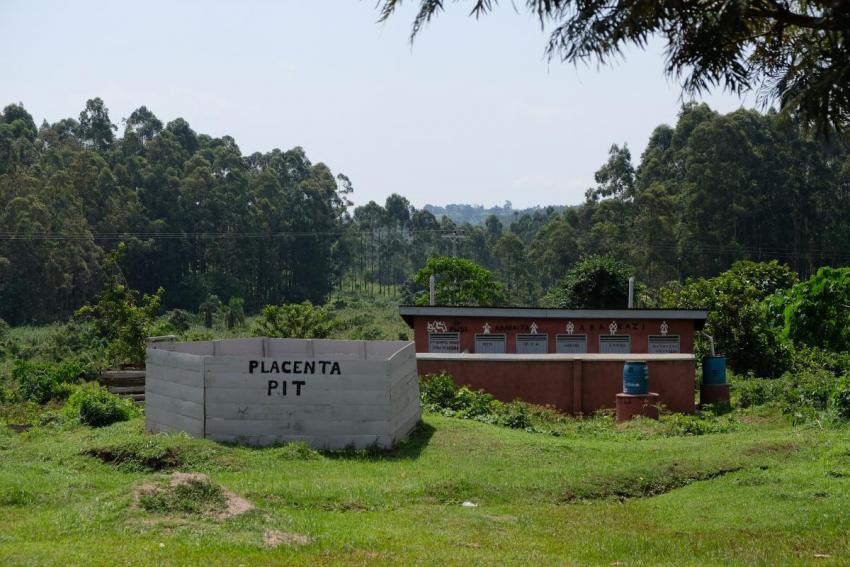
Placenta pit at one of the health care facilities funded by Conrad N. Hilton Foundation in the Kabarole District (photo: Laura Bosma/IRC)
To learn more about all the great work in the district, check out this interview on YouTube.
The Ministry of Water and Environment invited us to a meeting where we met Brian Guma (head of the department) and the rest of the team. We were introduced to the programme, and the work of the Ministry. We also talked about the continued strong and strategic partnership between the Ministry and IRC, and to accelerate the attainment of SDG 6.
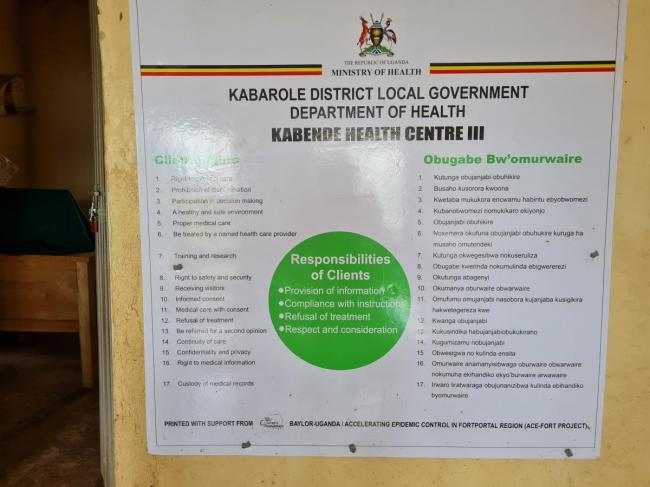
Information banner from Ministry of Health at Kabende Health Centre (photo: unknown/IRC)
My colleagues were shocked and surprised that I visited the Owino market (the largest market in East Africa) on my own. Apparently, it is quite notorious, but even with the heat and the crowded streets, I enjoyed the experience. After Owino market, I escaped the packed and busy city for a boat trip on Lake Victoria, the lake from which the Nile river originates.
My last days in Uganda were mostly in the IRC office in Kampala where I saw a significant difference between the various neighbourhoods. We drove through different kinds of areas where you could clearly see a difference in income. N’Tinda, for example, is where all the embassies are located. It looked prosperous and well-maintained, and I expect there is no trouble getting clean and safe water from the taps in that area. Whereas other neighbourhoods were struggling to get their basic needs met and where WASH facilities were harder to find.
Reflecting on my 10 days in Uganda. I am impressed to see the Ugandan team's hard work to promote political and financial commitment at both the national and district levels. The Kabarole district master plan is a milestone and the progress and development that has been made are impressive to see. It will help to achieve our goal of providing WASH to everyone, forever.
At IRC we have strong opinions and we value honest and frank discussion, so you won't be surprised to hear that not all the opinions on this site represent our official policy.